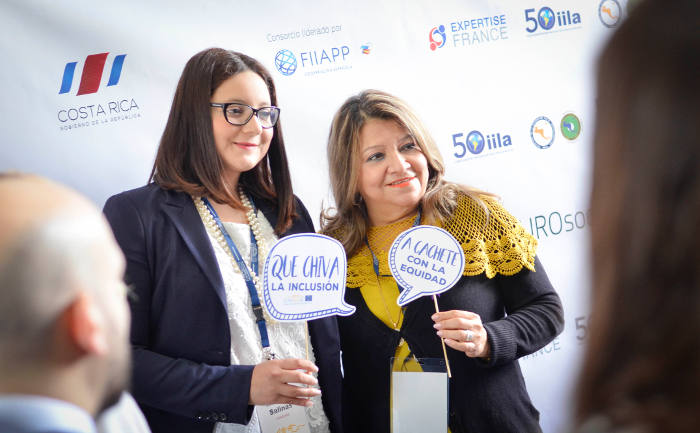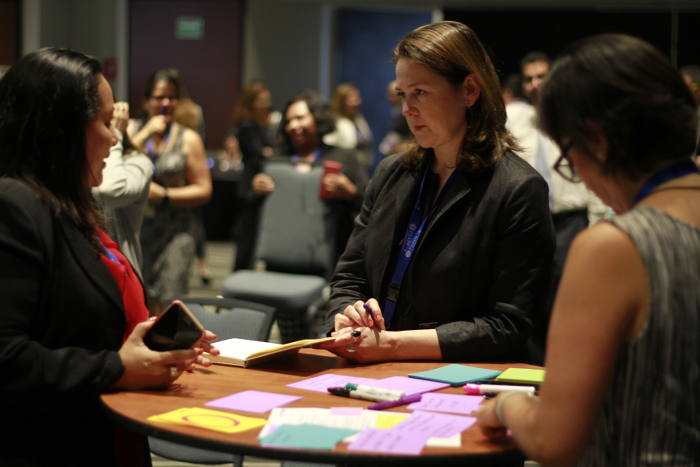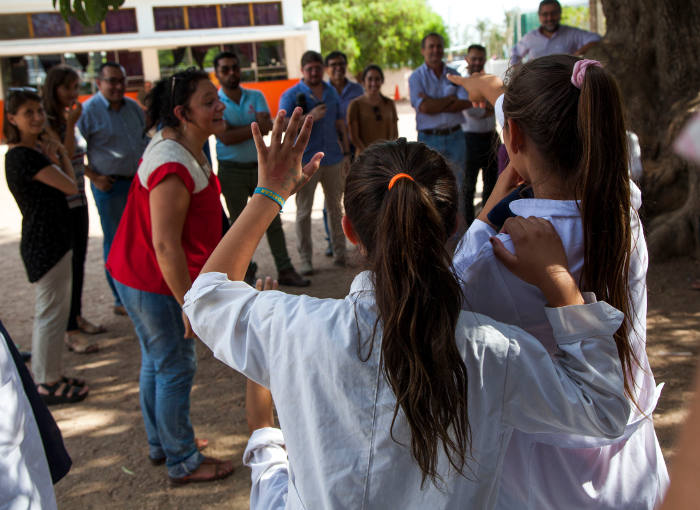-
|
04 October 2018
|Posteado en : Interview
Janet López, director of management and assessment with the Uruguayan Office of Planning and Budgets, and Teodora Recalde, director-general for budgets with the Paraguayan Ministry of Finance, recently presented their experience of assessment in their respective countries. Both institutions work with the EVALÚA project to improve the impact of various public policies on the public
What is being assessed?
Janet López: In Uruguay, we are now tackling the Casavalle Plan, which is a comprehensive policy and a demand that has to do with policies of inclusion. It is a project being developed by Montevideo City Council that has had input from various ministries, which have submitted different policies.
A comprehensive policy consists of input from a variety of stakeholders, from our Ministry of Social Development and Montevideo City Council: in regard to infrastructure, the housing sectors, how overall development is applied to sport and culture as an essential part of the development of a society. These different lines make this a comprehensive policy.
We are now gathering new data to check how this policy has progressed.
Teodora Recalde: In Paraguay, we started a process of performance budgeting in 2011. We began by introducing three types of performance indicators, public programme assessments and a management balance sheet. We are working very hard on the institutional assessment and starting to evaluate the designs and results of the different programmes, such as the agriculture programmes, judicial and prison programmes, health programmes and other institutions that have specific programmes.
Why is the assessment necessary? What is the objective?
J.L: The assessment is part of a long-term strategy. We are working on the entire public management cycle: planning, budgeting, monitoring and evaluation. Assessment was the final stage that we included.
The unit that I manage was created 10 years ago and maybe, a little over 10 years ago, no one even talked about assessment. So, as part of the entire public management cycle (planning, budgeting, monitoring and evaluation) the assessment unit was created in 2011. We started doing internal training and now we are tackling a variety of interventions in public assessment.
The fundamental objective is to improve management. This is not a punitive assessment; this must be made clear to the parties involved. It must really contribute to improving management and, in the end, to the use made of public resources
T.R: The purpose of the assessment, from the viewpoint of the budget and the Ministry of Finance, is to design programmes that will reach the public, and for the programmes that are implemented through the budget to have an impact and to look at where the investment is going.
What does EVALÚA offer as a project?
J.L. Casavalle is not the first project on which we have worked with EVALÚA. We have been doing this for some time and I think that EVALÚA contributes technical expertise, from support for reviewing all the terms of reference to the support that the administration of FIIAPP is providing us with. In turn, the exchange that EVALÚA makes possible with other countries in Latin America involved in the project also adds value. Exchanging the different viewpoints that we all have adds value.
T.R. For us, the EVALÚA project is a mainstay; there are comparative advantages in the complementarity between countries. They have created a new work scheme by stimulating the relationships between professionals in different departments, whether the planning department or the financial department, like ours, and an instrumental and methodological contribution to assessment.
What is it like working with EVALÚA?
J.L. To explain what it is like working with EVALÚA I could give examples of many activities. I could emphasise the exchanges and the formation of a common working agenda; the review of assessments that were made in another country and the expertise of the various technicians also add value. That is one aspect and we in particular are working on a monitoring and assessment skill development plan that, we understand, is part of having a nationwide and international language in common with the countries that are involved.
T.R. There are assessments that have already been made with other countries. In particular, in Costa Rica, we worked on the terms of reference for starting assessment and adopting these types of assessment models in that country. For us, this is an advanced process since we are just starting it.
What are the benefits for the public?
J.L There is going to be a direct benefit because what we want to do is to evaluate the real impact of the different policies and approaches that have existed in the region. And we are also going to work on consultative workshops with civil organisations. This will also bring about a result, feedback so that we can see where things must be improved or what to focus on.
T.R. The public will benefit as these programmes will be well designed and the services properly delivered, there will be a direct impact on the public.
In the assessment, viewed from a financial and budgetary point of view, the debate is where to cut resources. One never knows where to cut, so an evaluation is necessary. As you evaluate, you know where to invest. Because, if you invest well, the budget really reaches the public.
-
|
31 May 2018
|Posteado en : Reportage
A number of projects managed by FIAPP are taking part in the European Development Days 2018, with gender equality as the overarching theme
“Women and Girls at the Forefront of Sustainable Development: protect, empower, invest” is the slogan chosen for the European Development Days 2018, which will be held next week in Brussels. On 5 and 6 June, the capital of Europe will also be the capital of development.
This is because, this year, the days organized by the European Commission have gender equality as their central theme. As well as promoting the participation of women in the various forums, this edition hopes to make this a safer, more open and more inclusive world for all of them.
The most important development event in the world, which is open to the public, will pack 500 meetings into two days, in which more than 2,600 speakers will take part. Among them will be 7 Nobel laureates and 100 world leaders. FIAPP will also be attending the European Development Days (EDD) to represent four of the projects that it manages: EUROsociAL+, Bridging the Gap, Triangular Cooperation and EUROCLIMA+.
The EUROsociAL+ programme promotes cooperation and dialogue between the European Union and Latin America on promoting public policies to improve social cohesion and reduce inequality in Latin America.
However, for Enrique Martínez, Communication technician for the programme, “these public policies are only effective when they attack the inequality gap between men and women, a challenge and a goal that are strongly etched into the EUROsociAL+ DNA”.

This is why, in Brussels, the programme is sharing three advances in gender equality policies, in Paraguay and Mexico and, at the regional level, in Latin America. In addition European transfer on this subject.
The executive director of the Social Cabinet of the Office of the President of Paraguay, Mirta Denis, the executive secretary of the Mexican Institute for Women, Marcela Eternod, the director of Fundación Género y Sociedad, Ana Isabel García Quesada, and the French State Counsellor, Marisol Touraine, make up “100% female EUROsociAL+ panel as a contribution to this collective journey to full equality”, said Martínez. In addition, the round table discussion will be opened and closed by Jolita Butkeviciene, Director for Latin America and the Caribbean at the European Commission Directorate General for International Cooperation and Development.
The Bridging the gap project is also taking part in the 2018 European Development Days, with a session on Women on the rise – no one left behind!, organized jointly by the EU Social Protection Systems Programme and the NGO Light for the World. This is the presentation video:
The aim of this session, according to Carmen Serrano, the project’s communications technician, is to “show that, in spite of the two-fold discrimination that disabled women face, they are spearheading sustainable development in low-income countries”. Four women will therefore share their experiences of gender and disability issues based on the different viewpoints tackled by the three viewpoints structuring the session: Social protection, leadership and entrepreneurship, and access to work and economic empowerment. It will be moderated by Hisayo Katsui, a researcher into and expert teacher on disabilities.
However, said Serrano, “The aim of presenting “Bridging the Gap” at this great European event is not just to share experiences but to create a dialogue and reflection on the role of women with disabilities in their communities”. This is why they have chosen to use the format of a Brainstorming lab. For 75 minutes, there will be constant interaction between the speakers and the audience so as to collect inputs and ideas on how everyone can create awareness among those around them of the contribution that women with disabilities can make to society.
The Evalúa project, which seeks to promote Public Policy Evaluation in Latin America and the Caribbean, will attend the EDD’s for the first time to talk about some of the results obtained since its inception in 2014.
The project coordination team will attend this international cooperation forum to present one of its most recent projects, the results of the evaluation of the Costa Rican Gender Equality Policy. Also, the management, led by the Ministry of Planning (MIDEPLAN) evaluation team, will be represented by Ericka Valerio, from the Evaluation and Monitoring department.

The project is part of the ADELANTE programme, which aims to improve integration in Latin American and Caribbean countries and to contribute to their reaching their development goals (SDG). The EDD will be an important place for presenting the major conclusions and recommendations of that public policy evaluation and the planned use of this evaluation as an input to the following stages.
According to Alina Orrico, a project technician, “It is especially important to take part in this event, in which there are much fewer Latin American experiences than from other continents and, above all, because it is taking place in a year filled with emotions, demands and allusions to the need to present tangible answers that will guarantee gender equality.”
EUROCLIMA+ is the European Commission’s regional programme to promote environmentally sustainable development in Latin America. This action benefits the most vulnerable population groups, focusing in particular on gender, the impoverished rural population and indigenous peoples.
During the event, a video will be projected on Gender and Climate Change and an information map of Latin America will be drawn using gender-related information.

EUROCLIMA+ helps countries to develop their Nationally Determined Contributions or NDCs to the Paris Agreement. NDCs reflect the commitment of the international community to facing up to the effects of climate change.
According to Alexandra Cortés, an expert in Communication and Visibility for the programme, NDCs “promote the inclusion of climate action in a policy framework that can lead to economic growth and social development, in addition to protecting the environment and climatic resilience”.






